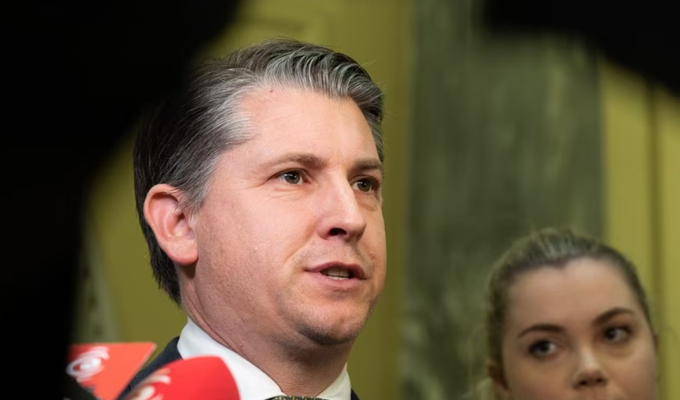By 1news.co.nz

The shareholdings are those in the telecommunications sector and the National Australia Bank.
“He’s repeatedly failed to identify, disclose and appropriately manage conflicts of interest,” Chris Hipkins said.
The shareholdings are those in the telecommunications sector and the National Australia Bank.
Hipkins made the announcement in an unexpected press conference this afternoon.
It follows Wood’s suspension from the transport portfolio on June 6 after it was revealed he had not immediately declared his shares in Auckland Airport. He remained in Cabinet holding other ministerial portfolios, such as immigration and workplace relations.
It was later revealed he had been advised they were problematic by the Cabinet Office and was reminded 12 times to sell them.
He offloaded the shares – worth about $16,400 on June 8, and donated the sum to a charity.
However, a parliamentary watchdog – the Registrar of Pecuniary and Other Specified Interests of Members of Parliament – decided an inquiry into whether Wood had complied with his obligations to declare certain interests under Parliament’s standing orders was warranted.
Hipkins has previously said he would withhold judgement on Wood’s political future until that process was complete. Today, he indicated that would continue and the new problematic shareholdings had been uncovered by Wood as part of that process.
But Hipkins said he learned yesterday of shareholdings Wood held in the JM Fairey Family Trust, of which he was both a trustee and beneficiary.
“These new shareholdings raise significant concerns around Michael not identifying and managing potential and real conflicts of interest.
“In particular, the trust holds shares in Chorus, Spark and the National Australia Bank.
“As Minister of Immigration, Michael made the decision to include telecommunications technicians on the immigration Green List.
“This followed representations from the telecommunications industry, including Chorus, seeking those changes to the Green List.
“Michael also has a shareholding in the National Australia Bank, the parent company of the Bank of New Zealand.
“That was not disclosed in any of the conversations Cabinet had around a market study into banking or other relevant Cabinet conversations.
“Despite repeated requests from the Cabinet Office and myself for Michael to manage his shareholdings, he has repeatedly failed to identify, disclose and appropriately manage conflicts of interest.”
Hipkins said when he stood Wood down as Transport Minister, he asked him if there was any other relevant information he should know about, and Wood had told him there was not.
“It has become evident, therefore, that not adequately managing the airport shares was not an isolated incident and it is not appropriate for Michael to continue as a minister.”
Hipkins said he had “indicated” to Wood he felt his continued position as a minister was “untenable”.
He said Wood was “crushed” and “devastated”, and while Hipkins did not believe Wood had acted with “any intent of personal gain”, his actions had “let himself and the Government down”.
“He is a talented and hard-working Minister. However, he has shown a serious lapse of judgement and has taken the appropriate action by resigning.”
Wood will be replaced in the Auckland and workplace relations and safety portfolios by Carmel Sepuloni. Andrew Little will take his place as Immigration Minister, and David Parker as Minister of Transport. Kiritapu Allan would take on Wood’s vacated role as an Associate Finance Minister.
Conflict of interest changes floated
Hipkins said he had also decided New Zealand’s system of managing Cabinet ministers’ potential conflicts of interests should change.
“When I learned that Michael had failed to sell his Auckland Airport shares despite 12 requests from the Cabinet Office to do so, I asked the Cabinet Secretary to provide advice on practical steps that could be taken to ensure such a situation could not be repeated.”
He said as a result he had agreed to five changes to “tighten up” the disclosure regime for ministers.
He said they were:
1. The Cabinet Office will move to quarterly reporting of conflicts of interest to the Prime Minister.
Currently Prime Ministers are only advised of new interests as part of the annual review or on an ad hoc basis as particular issues arise.
2. The implementation of an escalation process if a minister is not engaging fully with the process or following advice on the management of a conflict.
The Cabinet Office will now escalate the matter “rapidly and directly” to the Prime Minister, “to avoid the situation where a minister can repeatedly ignore their guidance”.
3. The implementation of in-person annual reviews with each minister to discuss their conflicts.
Currently, the annual review of ministers’ interests is conducted by way of a letter at the end of the financial year.
An in-person meeting would “ensure that any issues can be more directly addressed and resolved”.
4. Each minister will have to nominate a dedicated person in their office to support them with conflict-of-interest processes.
“This means another person in their office is aware of their conflicts and can act as a second pair of eyes to assist them in the appropriate management of them.”
5. Conflict disclosures will become a standing item at the start of each Cabinet or Cabinet Committee meeting.
Hipkins said the Institute of Directors recommends maintaining an interests register as a standing board meeting agenda item, but that had not been the past or current practice for Cabinet or Cabinet committee meetings.
Hipkins had also sought advice on a full Restrictions Regime on shareholdings for ministers.
“In Australia, the code of conduct for ministers requires that they divest themselves of investments and other interests in any public or private company or business.
“That is, other than public superannuation funds or publicly listed managed funds or trust arrangements where the Minister has no visibility or control of decision-making.
“Adopting this approach would be a significant change in the New Zealand position and requires further consultations, but it is my personal view it’s appropriate to take this step.”


